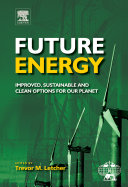
Future energy : improved, sustainable and clean options for our planet
By - "Letcher, T. M.
Floor
-
Floor 1
Published
-
Elsevier, Amsterdam, ©2008
ISBN 10 - 0080548083
ISBN 13 - 9780080548081
Book Status
-
1 Qnty Available with us.
Subject
-
Clean energy industries
Shelf No
-
17
Call Number
-
333.79 LET
Physical Description
-
1 online resource (xxii, 376 pages, 16 unnumbered pages of plates) : illustrations (some color), maps
Notes
-
Includes index